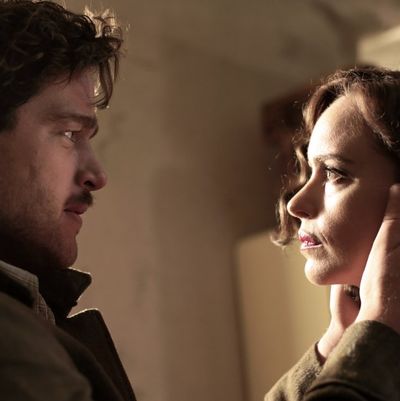
In Christian Petzold’s Phoenix, the tall, blonde German actress Nina Hoss plays Nelly Lenz, a Jewish nightclub singer who survives a concentration camp — despite being shot in the face by the Nazis and left for dead — and returns to a rubbled postwar Berlin in search of her non-Jewish husband, Johnny (Ronald Zehrfeld). This is Hoss’s sixth film with Petzold (most recently, she was a battered wife in Yella and a persecuted East German doctor in Barbara), and it’s not the first time that she has played a traumatized ghost. The Holocaust has obliterated not only Nelly’s face but also her identity, her sense of self, her place in the world. Her friend Lene (Nina Kunzendorf) insists that it was Johnny who gave Nelly up to the Nazis to save his own life and that she should leave Germany for Haifa, where there’s an apartment waiting for her. But Nelly — though she doesn’t articulate it, moving throughout the film in a trance — thinks that only Johnny can bring her back to life.
What follows is a haunting, morbidly romantic melodrama with obvious links to Vertigo, but from a reverse angle. A plastic surgeon does a remarkable job — Nelly emerges very beautiful. But she’s still not, in her own mind, Nelly, physically or spiritually. When she finds Johnny busing tables in the American sector, he doesn’t recognize her — he’s sure his wife is dead. He does, though, regard this woman as a godsend. He thinks she looks enough like his wife to be able — with the right clothes and hair and walk and way of speaking — to pass herself off as Nelly and collect Nelly’s substantial inheritance. And the dazed Nelly allows him to coach her. She wants to tell him who she really is, but something holds her back. She wants him to see her.
The movie’s running musical motif is Kurt Weill’s yearning “Speak Low,” with lyrics by Ogden Nash: “Speak low when you speak, love. Our summer day withers away, too soon, too soon …” It’s strummed by a bass in the opening scene. It’s played in a club that’s like a grotesque echo of Weimar cabarets, this time for American soldiers. It was a song that Nelly used to sing accompanied by Johnny on the piano. It permeates the film with its aura of love and death conjoined.
Thanks to Johnny’s obtuseness, the film goes on a mite long. But Zehrfeld — who acted opposite Hoss in Barbara — keeps you guessing about why Johnny can’t read her. He bears a resemblance here to Oliver Reed, brutish but with a hint of something soft: You know if he’d stop conniving and really look at Nelly, he’d understand. More and more, though, you realize that he doesn’t want to look.
Phoenix is all Nina Hoss, though. She’s now one of the world’s most riveting screen presences — and I hear she’s great onstage, too, and that she sings opera. She’s different here than I’ve seen her before — the opposite of self-possessed. Nelly is disconnected from her own body. With her downturned mouth, thick underlip, and dark bags under her eyes, Hoss’s Nelly looks at times like Jeanne Moreau. But those eyes shine with a sort of glassy hope. It’s heartbreaking to see the flash of anguish in them when Johnny tells her that her walk is all wrong, that she’s nothing like Nelly and can’t pull off the charade. What makes Phoenix finally so devastating is the realization that it’s not Johnny who needs to see Nelly, it’s Nelly who needs to see Johnny. Only then can Nelly — like so many brutalized, disfigured souls — find her place in this ravaged, postwar world.


